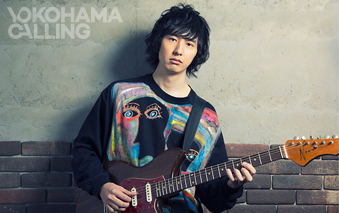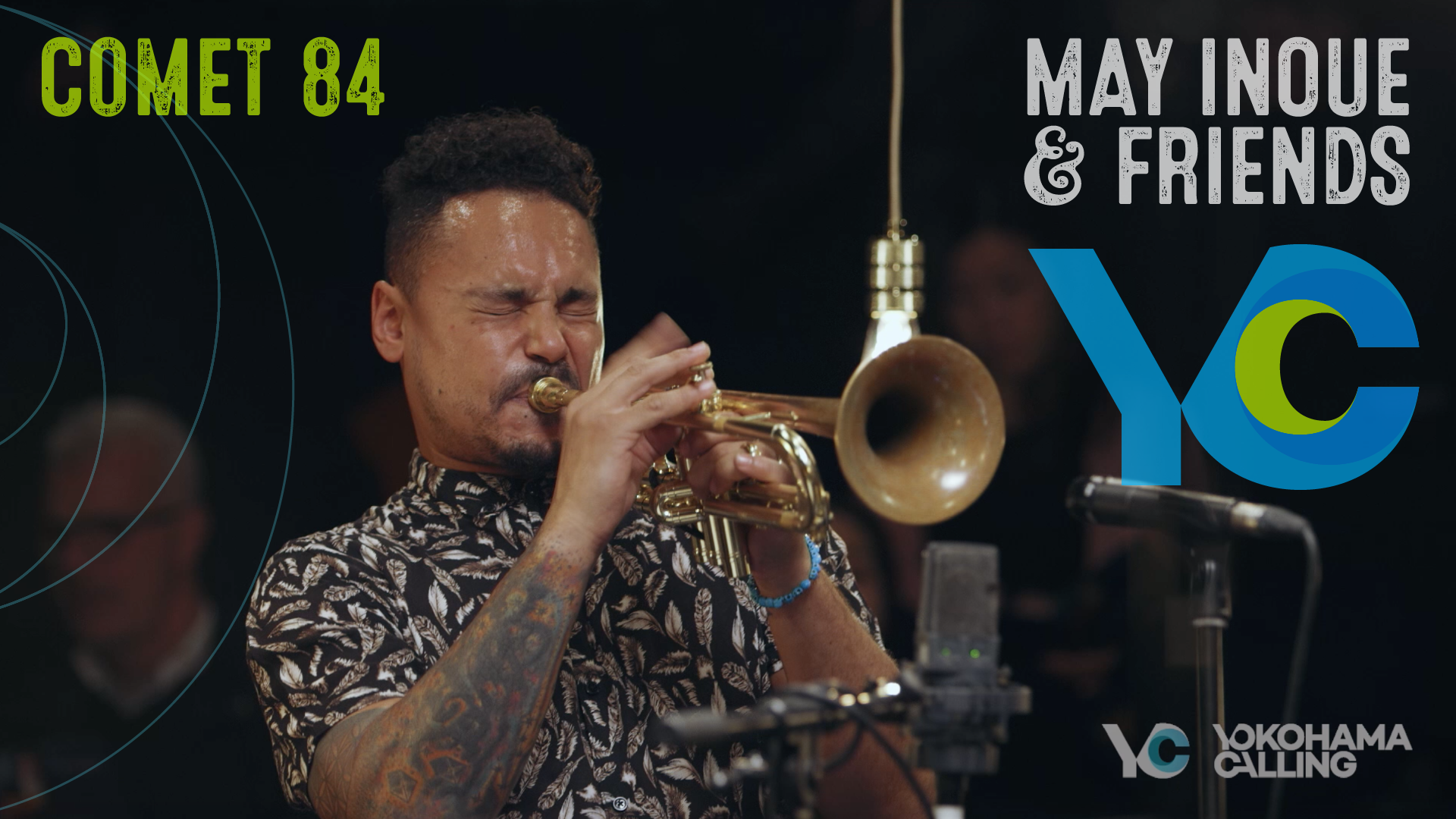“I would like to pursue something nobody has done so far”.
The 27-year-old guitarist says smoothly, who woke up to Jazz when he was 15 years old, since then he’s been creating his own music, aspiring borderless sounds.
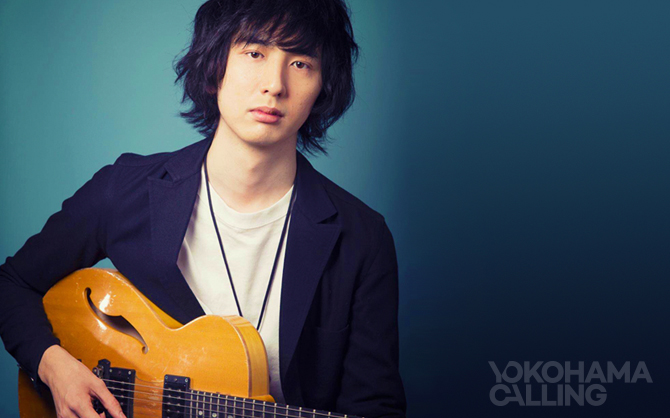
May Inoue is one of the top musicians from the young generation currently gaining attention on the Jazz scene in Japan. He has formed a new project “Stereo Champ” to express his creativities as both a guitarist and a composer and is enjoying enthusiastic reviews from every quarter.
On 25th November 2018, May will make his debut UK performance with acclaimed local musicians at The Cockpit. He speaks to us about his music and his link to London.
A link to London before he was born
Congratulations on the first London performance! You have studied in Berklee College of Music and had music activities in N.Y. But the first time in London?
Well, I visited London once when I was a kid. My dad has lived in London many years ago for one or two years. Then my mom came to London to join him. The name of the building of their flat was “Mayflower House”. I was born just after their stay in London and born in May, for those reasons I was given my name, May.
What a lovely story!
Yeah, this is one of the favourite family stories. My dad loves London, so he took me to his favourite city when I was 12 years old. A few years later, I started to be interested in music and fell in love with Led Zeppelin. I had noticed that this band is from the UK. That is why the UK has been my favourite country and the place that I have been longing for since.
How were you switched on to Jazz despite you being a rock boy?
My dad took me to a Mike Stern concert in Tokyo when I was 15 years old because dad understood well about my interest of rock guitar. When I saw Mike’s concert, I had a great inspiration from his style which is between rock and jazz then I felt sure this is what I want to do. That was the opening to jazz music. After this event, I studied under Mr Yoshiaki Miyanoue who is a veteran jazz guitar player. He understands the importance of 1950 – 60’s traditional jazz music and told me that I should start from here because this is the most fundamental base of jazz even though I will be pursuing varieties of jazz sounds in the future. He gave me great lessons. I deleted all songs by Led Zeppelin from my iPod then started listening to only traditional jazz for learning.
You must have been a cool high-school boy.
I lost a few friends though (laugh). I have been playing the guitar all the time while I was in high school. I was exactly a “domestic guitarist” (laugh). According to my mom, I have already held my guitar when she saw me in the morning after I just got up from my bed. I was so happy while playing the guitar. I would practice every single day during the whole summer holiday for about 40 days, only taking breaks to walk my dog. When I went to school after the holiday, I could not accommodate to talk to my friends because I haven’t talked to anyone for such a long period, then I found that people’s cheek muscle cramped up if you haven’t used it. I loved practice to that degree.
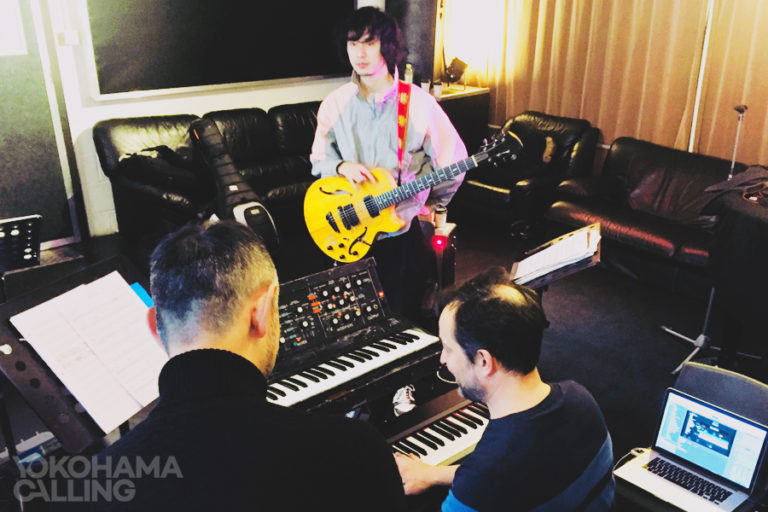
May Inoue in rehearsal with Jason Rebello
Music of May Inoue
Tell us about your own project, Stereo Champ.
Stereo Champ is a band I formed to express my own music. I started it because I wanted to pursue sounds that nobody has done in jazz field so far. I had already released two albums before Stereo Champ – both two albums followed orthodox jazz but what I tried in the first Stereo Champ project was making a statement about my groove. I wanted to express my jazz with some feeling of rock, funkiness, psychedelic and other sounds. What I’m doing now in my project might be already done by someone else in the world but this is fresh and new to me. I aim to create my music being edgy but with definitely some kind of comfort or coziness. I would like to open up new music respecting the achievements by predecessors.
You expressed the energy of Stereo Champ as “feeling of cosmic boundlessness” in liner notes of the first Stereo Champ album. What does it mean actually?
That means that our energy is beyond stereotype / ready made ideas.
In the first album by Stereo Champ, there are two songs about pre-born child. I found this is quite unusual being created by a mid-twenties male.
Taiji Song is composed of two parts but basically that’s one song. I created those songs to express the process of how people are born to this world from where they are floating in their mother’s womb to the moment of birth. All the people in this world were once a fetus. They don’t have any ego yet, just pure existence and they don’t know what they will become after. For example, I became a guitarist which I would never know when I was a fetus. I think that status is the same after we are born. That means that we never know what will happen next. I think the nature of this status is related to jazz improvisation in a way. We don’t know how jazz Improvisation will evolve after a second even though it has some formats. I found this aspect of jazz improvisation is just like our life. My jazz spirit is thrilled at this aspect indeed. I really enjoy it, that’s the reason why I keep doing jazz – the future is always open to what you want to create.
Is that your quality of music? What sort of music are you aiming to create?
The music that has nothing to do with copy. For example, many people follow jazz transmitted from N.Y. because it’s supposed to be home of contemporary jazz. However, there is certainly a unique jazz scene / culture in Japan. I think there must be some meanings why we were born as Japanese as well. In that way, I would like to create our own Jazz.
Can you tell us about jazz in Japan? What is Japanese jazz?
We got so many jazz clubs in Japan, especially in Tokyo and Yokohama compared to other cities in the world. That means that numbers of jazz musicians are inevitably a lot. There are many jazz musicians who can play multiple instruments but I feel there are fewer experts who have excellence in one area. I recognise there is the unique jazz scene / culture you can say “Japanese jazz” in Japan, which has been built by those great musicians. I love sounds created by those musicians who know what they are really interested in and honest with it. People who challenge their own sound honestly. I love those people.
Have you met those people in Berklee College of Music too?
Well, I am a kind of person who does his own stuff in his own style alone, so my school life wasn’t very active to be honest (laugh), but I was lucky to meet my guitar teacher, Mick Goodrick there. He has had many notable students including Pat Metheny, John Scofield and Mike Stern. One of the reasons why I went to the college was to meet him. I loved his class. I’ve almost forgotten music theories that he taught us (laugh), but do remember how he taught us. He is very rigorous, so I always prepare well to the class with rare earnest. One day I went to his class feeling the strain, but he suddenly suggested us to draw a picture of horse, or take a walk out of the room. He taught me something not only related to music – an attitude towards music broadly.
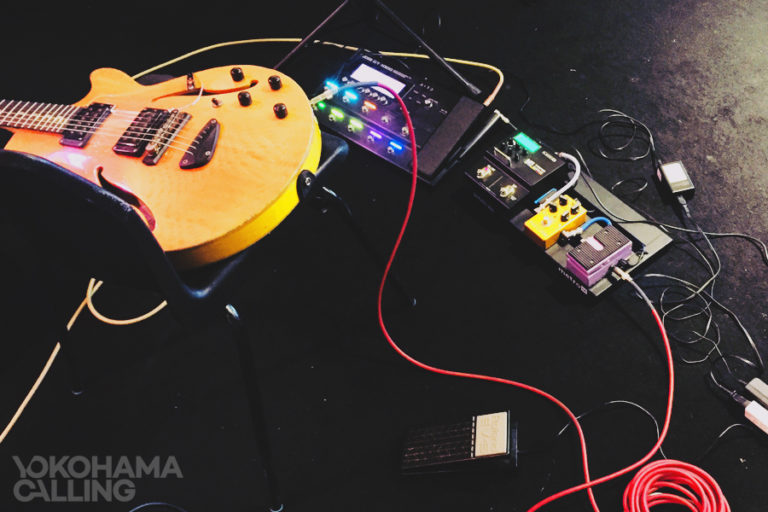
Future vision
Tell us your future works and visions.
Two new albums will be released on 14th November ahead of the London concerts. One is the 2nd album by Stereo Champ, called “Mono Light”. And the other is my acoustic guitar album called “Solo Guitar”.
“Mono Light” is officially a band album as Stereo Champ, whereas the previous one is called “May Inoue Stereo Champ”. Therefore, we focused on band sound and team work much more this time. Also this is my best album so far as a composer, I am very satisfied with the quality as I put all of my current best ideas into this album. This is sort of an album you don’t know where to categorise. We made lots of comfort points as well. I would like to release one album yearly in the future as Stereo Champ. “Solo Guitar” is based on my acoustic guitar gigs that I perform every four months now.
I also would like to host a music event bimestrially with like-minded musicians from next year. The idea is to attract a young audience to the Japanese jazz scene and to create fresh fields where Japanese musicians who are forward looking can make good activities. By doing those in Japan, at the same time, I would like to increase our activities in overseas as a band, too. I see more interesting visions beyond those activities.
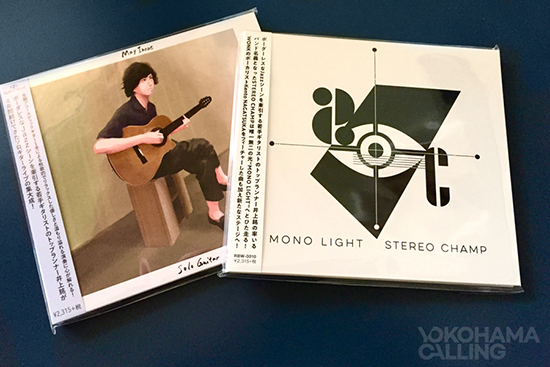
May Inoue releases two albums in 2018 ‘Solo Guitar’ & ‘Mono Light – Stereo Champ’
About the London concerts
Tell us about your London concerts.
In the Cockpit on 25th November, we are playing both traditional jazz and my original songs. Although I am sure I will be nervous (laugh), I will try to remain calm. It will be the best if I can become neutral when we make the first sound on the stage. I have learnt that I will be able to play best when I feel neutral.
I have already checked some local musician’s videos who I will be playing with. We will be playing my original songs mainly although they are top musicians with fantastic careers. Therefore, I will try to make a stage that all of us can enjoy evenly by making solid sound in rehearsals.
I have heard that you will be playing as an opening act on the stage of Mike Stern at Ronnie Scott’s on 24th November. What a great surprise! (it’s sold out already)
Yes, I am so happy with this! I haven’t expected any of this, this time last year. I feel some kind of wonderful coincidence. We will play as a trio. We will play more jazz standard rather than my original songs so that all the members can enjoy the jazz ensemble evenly. What will I say to Mike Stern at Ronnie’s? Well, I would say that “you are one of my great guitar heroes, I’ve started playing the guitar because of your influence”.
Give us your message to London audience!
I am so glad to play in London for the first time where I have been longing for. I look forward to meeting you all and playing my best music so far! I also feel very lucky as I can play in Ronnie Scott’s where I wanted to visit anyway, even if I don’t play there.
Tell us about yourself without music.
I love Japanese variety TV programs. When I have free time, I would face a dilemma if I should practice the guitar or watch TV (laugh). I love talking with people. I love people. People are so interesting!
Interview by Mayu Ekuni
This interview with May Inoue is available in Japanese here.
Listen to May’s music:
May Inoue – Stereo Champ – 2017 : Listen here
May Inoue – Solo Guitar – 2018 : Listen here
Mono Light – Stereo Champ – 2018 : Listen here

